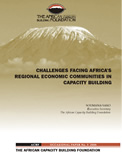
The concern for regional cooperation and integration in Africa predates independence. The period 1960-1980, however, witnessed the emergence of the major regional integration schemes that pushed forward the Continent’s economic integration agenda. Post-independence regional economic integration and cooperation efforts resulted in a variety of initiatives with overlapping membership and mandates, making Africa the region with the highest density of economic integration and cooperation arrangements. Yet, these arrangements failed to impact positively on the Continent’s economic performance. Inadequate political will and commitment to the process; high incidence of conflicts and political instability; poor design and sequencing of regional integration arrangements; multiplicity of the schemes; inadequacy of funding; and exclusion of key stakeholders from the regional integration process are factors accounting for the ineffectiveness. Despite Africa’s unsatisfactory track record in regional integration over the decades, the case for cooperation and integration has become much stronger in recent years, due to the fact that the continent is facing a number of major challenges, notably globalization and the changing global economic and political environments, to which enhanced cooperation and integration constitute an appropriate response.





